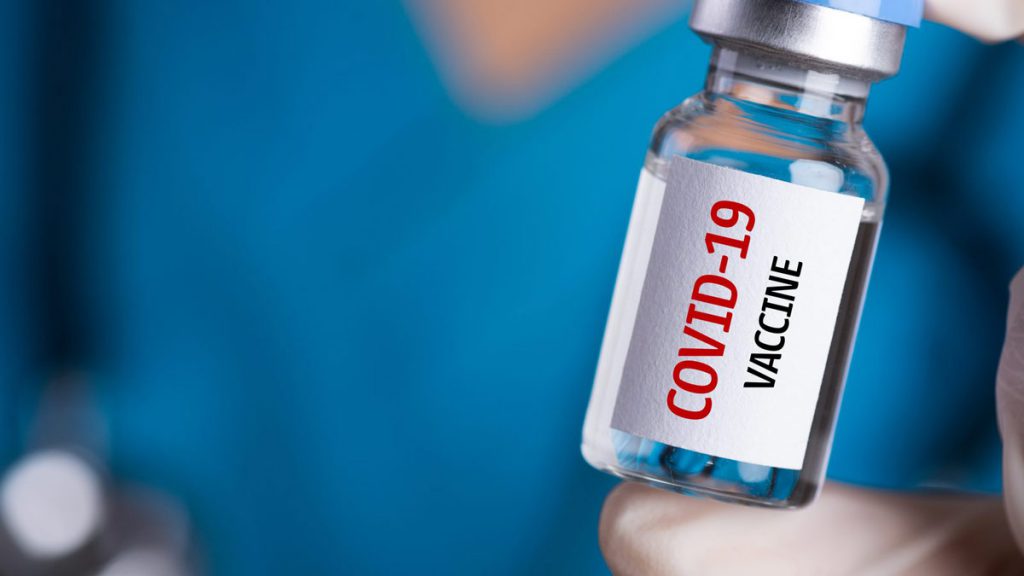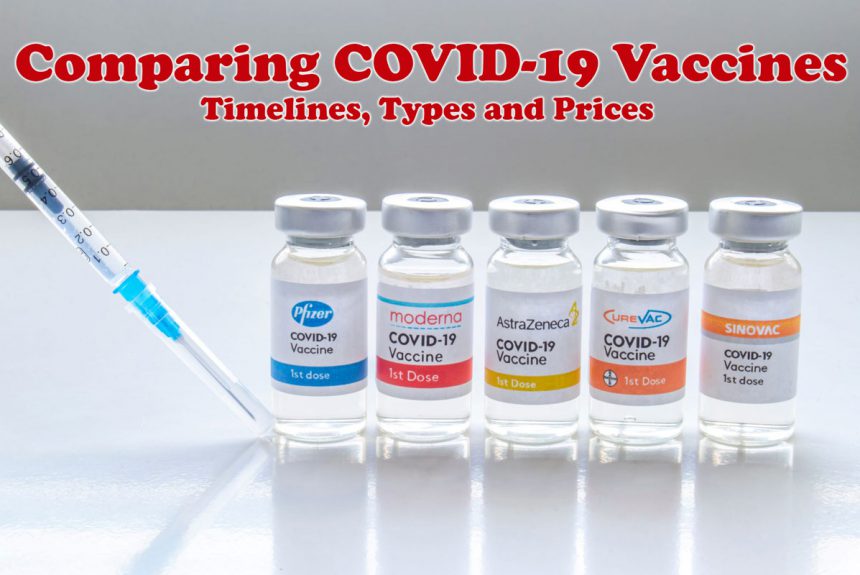This is an update of an article originally published on November 24, 2020. New data is coming in on the efficacy of the various vaccines, and the Pfizer-BioNTech and Moderna vaccines are being distributed in the U.S. and other countries.
A note on variants:
Wuhan or wild type
The first strain to be identified that originated in the city of Wuhan, China.
UK
Dubbed B.1.1.7, the UK variant was first identified in the fall of 2020. It spreads more easily and quickly than other variants, according to the CDC, and potentially is 30% more lethal than the wildtype version, although that is still being investigated. It was first detected in the U.S. at the end of December 2020.
South Africa
Dubbed B.1.351, it emerged independently of B.1.1.7 (UK) and was first detected in South Africa in early October 2020. It shares some of the same mutations as the UK strain. Cases in the U.S. were first reported at the end of January 2021. At this time, it is the variant that has most experts the most concerned, because it seems less responsive to existing vaccines and antibody therapies. That said, current evidence suggests it does respond to them, just not as well as the other major known variants.
Brazil
The Brazilian variant is called P.1 and was first identified in people traveling from Brazil during routine testing in Japan, in early January. It appears to have a group of additional mutations that affect its ability to be recognized by antibodies, according to the CDC. It was first observed in the U.S. at the end of January 2021.
New York
This variant first appeared in New York City and then sporadically in the northeast. It has been named B.1.526. One of the mutations is similar to that seen in the South African variant that seems to help it evade the body’s response to vaccines. The data on this has, as of February 25, 2021, not been peer-reviewed. The mutation of concern is called E484K, which has been observed in at least 59 different lineages of coronavirus. This means it is evolving independently around the world in what is called convergent evolution.
California
This variant is called B.1.427/B.1.429 and appears different than the UK variant. One of the mutations, called L452R, affects the virus’s spike protein, which may allow it to attack itself more efficiently to cells, making it more infectious. Again, like the New York variant, the data has not yet been peer-reviewed. However, it appears to be associated with severity of disease and increased risk of high oxygen requirement. In particular, this virus appears to be prevalent in the San Francisco area.
A note on pricing:
The prices listed, for the most part, are the prices that were originally published at the time this article was first published. Because of multiple contracts by various governments and how they are being reimbursed, there is significant variability in actual prices. Some have significantly dropped since the original publication and appear to be changing regularly. Also, there are significant variations in pricing from country to country. If you find any variations or inaccuracies, please let us know.

1- Pfizer-BioNTech
The Pfizer-BioNTech COVID-19 vaccine was sent to the FDA for possible Emergency Use Authorization (EUA) on Friday, November 20 and authorized on December 11. It is an mRNA vaccine that codes for the virus’s spike protein and is encapsulated in a lipid nanoparticle. Once injected, the cells churn out the spike protein, triggering the body’s immune system to recognize the virus. In Phase III trials, it demonstrated 95% efficacy. The Pfizer-BioNTech vaccine requires storage at about -94 degrees F, which requires specialized freezers.
Type: mRNA
Doses: 2, 21 Days Apart
EUA Date: December 11, 2020
Price: $19.50 per dose for first 100 million doses
Efficacy: About 95%. Apparently 100% at preventing hospitalization and death.
Variants: Lab data suggest “quite effective” against the UK variant as well as the South African and Latin American variants.
2- Moderna
On November 16, Moderna issued a preliminary data readout out of its COVID-19 vaccine, suggesting an efficacy rate of 94.5%. It was authorized by the FDA on December 19. Like the Pfizer-BioNTech vaccine, it is an mRNA vaccine. Unlike that vaccine, however, the Moderna vaccine is stable at 36 to 46 degrees F, about the temperature of a standard home or medical refrigerator, for up to 30 days and can be stored for up to six months at -4 degrees F. It is expected to go to the FDA for consideration for an EUA within days.
Type: mRNA
Doses: 2, 28 Days Apart
EUA Date: December 18, 2020
Price: $25-$37 per dose
Efficacy: About 95%. Apparently 100% at preventing hospitalization and death.
Variants: Lab data suggest “quite effective” against the UK variant as well as the South African and Latin American variants.
3- AstraZeneca-University of Oxford
On November 23, AstraZeneca and the University of Oxford announced high-level results from an interim analysis of their COVID-19 vaccine, AZD1222. The analysis was from the trials in the UK and Brazil and demonstrated efficacy of up to 90%. The vaccine was effective at preventing COVID-19, with no hospitalizations or severe cases in people receiving it. There were a total of 131 COVID-19 positive cases in the interim analysis group. One dosing regimen was given at a half dose and demonstrated 90% efficacy, followed by a full dose at least one month apart. Another dosing regimen demonstrated 62% efficacy when given two full doses at least one month apart. The combined analysis showed average efficacy of 70%. The AstraZeneca vaccine can be stored, transported and handled at normal refrigerated conditions, about 36-46 degrees F for at least six months and administered within existing healthcare settings.
On March 25, 2021, AstraZeneca released primary analysis that the vaccine demonstrated 76% efficacy against symptomatic COVID-19, 100% efficacy against severe or critical disease and hospitalizations, and 85% efficacy against symptomatic COVID-19 in people 65 years and older.
The AstraZeneca and University of Oxford’s vaccine uses technology from an Oxford spinout company, Vaccitech. It deploys a replication-deficient chimpanzee viral vector based on a weakened version of a common cold virus (adenovirus) that causes infections in chimpanzees. It contains the genetic materials of the spike protein. After vaccination, the cells produce the spike protein, stimulating the immune system to attack the SARS-CoV-2 virus.
The COVID-19 vaccine developed by AstraZeneca and the University of Oxford has been linked to blood clots. More than a dozen European countries have halted distribution of the AstraZeneca-Oxford vaccine as a result. To date, there have been about 222 suspected blood clotting cases in Europe with more than 30 deaths linked to the AstraZeneca-Oxford vaccine, out of 34 million vaccinations. In these cases, the clots are pulmonary embolism, deep vein thrombosis (DVT) or thrombocytopenia.
Type: Adenovirus-based
Doses: 2, 28 Days Apart
Likely EUA Date: Authorized in Europe on January 12, 2021, and other countries, but unlikely in the U.S. until spring
Price: $2.15 (U.S.) in the EU; $3-4 (U.S.) in the UK and U.S.; $5.25 (U.S.) in South Africa
Efficacy: Currently about 70% overall.
Variants: At least one study finds it has little effect against the South African variant, but appears effective against UK and Brazilian variants.
4- Johnson & Johnson
Johnson & Johnson announced on November 15 that it initiated a second global Phase III trial of its Janssen COVID-19 vaccine. They expect to enroll up to 60,000 volunteers worldwide.
Whereas all of the other three vaccine candidates require two doses about 28 days apart, the J&J vaccine only requires a single dose. Interim results from its Phase I/IIa trial demonstrated a single dose of the vaccine induced a robust immune response and was generally well-tolerated. The ENSEMBLE 2 study evaluated a two-dose regimen as well.
The Phase III ENSEMBLE trial demonstrated the single-shot vaccine is 66% effective overall in preventing moderate-to-severe COVID-19, 28 days after vaccination. However, it demonstrated 100% efficacy ad preventing severe disease after day 49.
The vaccine uses the company’s AdVac technology platform, which it used to develop its approved Ebola vaccine and its Zika, RSV and HIV investigational vaccine candidates. It revolves around the use of an inactivated common cold virus, similar to what the AstraZeneca-University of Oxford program utilizes.
In April 2021, the CDC and FDA recommended a pause on distribution of the Johnson & Johnson COVID-19 vaccine. Six cases of a “rare and severe” type of blood clot had been identified. The clots observed with the J&J vaccine are cerebral venous sinus thrombosis (CVST) in combination with low levels of blood platelets, called thrombocytopenia. All six of the cases were in women between the ages of 18 and 48 and occurred six to 13 days after receiving the single-dose vaccine. These six cases were extremely rare, out of more than seven million doses administered. An FDA advisory committee is expected to make a recommendation on resuming distribution on April 23.
Type: Adenovirus-based
Doses: 1
Authorized
Price: $10 per dose
Efficacy: In J&J’s global clinical trial, it demonstrated 66% efficacy at preventing symptomatic COVID-19 infections. In the U.S. it was slightly higher, 72%. Appears to be 100% effective at preventing hospitalizations and death.
Variants: Based on clinical studies in Africa, UK and Latin America, there is evidence the vaccine is effective against the variants, although less so against the South African and Latin American strains.
5- Russia’s Sputnik V Vaccine
Around November 11, Russia’s National Research Center for Epidemiology and Microbiology, which Russia authorized for use in August—ahead of even beginning a Phase III trial—claimed had an efficacy rate of 92% after the second dose. It was based on a first interim analysis 21 days after the first injection during the ongoing Phase III study. On November 24, the organization claimed 95% efficacy based on new preliminary data. On December 14, 2020, they reported efficacy of 91.4%. It also offered to share one of its two human adenoviral vectors with AstraZeneca to increase the efficacy of the AstraZeneca vaccine.
Russia’s Gamaleya research institute appears to be focused on potentially marketing their vaccine worldwide. Even the name of the vaccine has emphasized the idea of a race. The organization has indicated a dose of the vaccine will cost no more than $10, about half the cost of the Pfizer vaccine. The organization has also predicted they could produce 1 billion doses in the next year. At this time, aside from Russia, it will potentially be sold in India, Korea, Brazil, China, and Hungary. The Hungarian government is the only European Union country to express interest to date.
On February 2, 2021, The Lancet published Phase III data demonstrating a 91.6% efficacy against the original strain of the virus.
Type: Adenovirus-based
Doses: 2
Likely EUA Date: Not applicable in the U.S.
Price: $10 per dose
Efficacy: 91.4%
Variants: Unknown. Clinical trial data was largely conducted in Russia prior to the emergence of major variants.
6- Sinovac Biotech
On January 13, 2021, China-based Sinovac Biotech reported that its COVID-19 vaccine had a 50.38% efficacy in late-stage clinical trials in Brazil. The company’s clinical trials are demonstrating dramatically varying efficacy rates. In Indonesia, a local trial demonstrated an efficacy rate of 65%, but the trial had only 1,620 participants. Turkey reported an efficacy rate of 91.25% in December 2020. Another trial in Brazil run by a local partner, Butantan Institute, reported last week a 78% efficacy rate in mild cases while 100% against severe and moderate infections. It is an inactivated vaccine that uses inactivated SARS-CoV-2 viruses.
Type: Inactivated SARS-CoV-2 virus
Doses: 2
Likely EUA Date: Not applicable in the U.S.
Price: $60 per dose in China ($29.75 per dose)
Efficacy: 50.38% to 91.25%, depending on the clinical trial
Variants: Unknown, although a study in Brazil demonstrated 50.4% efficacy at preventing symptomatic infections.
7- Novavax
On January 28, 2021, Novavax announced that its COVID-19 vaccine, NVX-CoV2373, hit the primary endpoint with a vaccine efficacy of 89.3% in its Phase III trial in the UK. The vaccine is a protein-based COVID-19 vaccine candidate. It also has data from the South Africa Phase IIb trial and several Phase I, II and III trials. It has demonstrated high clinical efficacy against the UK and South Africa variants as well.
The vaccine contains a full-length, prefusion spike protein made using the company’s recombinant nanoparticle technology and its proprietary saponin-based Matrix-M adjuvant. It is stable at 2 to 8 degrees C and shipped in a ready-to-use liquid formulation.
Type: Protein-based vaccine
Doses: 2
Likely EUA Date: Possibly in March or February 2021 in the UK; possibly Q1 2021 or later in the U.S. Most recent suggestion for EUA in the U.S. was May 2021.
Price: $16 in the US
Efficacy: 89.3%
Variants: Effective against UK and South African
8- CanSino Biologics
CanSino Biologics vaccine was co-developed with the Chinese military. It has an efficacy rate of 65.7% at preventing symptomatic cases. This is based on a multi-country analysis first posted on Twitter by Faisal Sultan, Pakistan’s health adviser, on February 8, 2021. The Phase III trial includes 30,000 participants and demonstrated 90.98% efficacy in preventing severe disease. It only requires a single shot. It has agreed to supply 35 million doses to Mexico and is in talks with Malaysia for 3.5 million shots. Pakistan is running one of the largest trials, and has contracted for 20 million shots. It is also working with the WHO for approval for the vaccine through the Covax program. It is also planning a trial with Russia to determine if swapping the second dose of Russia’s Sputnik V vaccine with Can Sino would produce the same or better protection.
CanSino Biologics announced it will initiate clinical trials next week of an experimental COVID-19 vaccine that is inhaled, instead of injected. This follows some controversy over China’s COVID-19 vaccines, which the director of the Chinese Center for Disease Control publicly admitted “don’t have very high protection rates.” As a result, the Chinese government was considering alternate vaccines to increase vaccine efficacy in the country. In a trial in February, the vaccine demonstrated an efficacy of 65.7% in preventing symptomatic cases. But in April, the company noted that its efficacy rate seemed to drop over time but should have a rate of 50% or more five to six months after inoculation.
Type: Viral vector, loading an antigen from the SARS-CoV-2 virus onto an adenovirus.
Doses: 1
Price: Unknown
Likely EUA Date: Not applicable in the U.S.
Efficacy: 65.7% at preventing symptomatic cases; 90.98% efficacy in preventing severe disease.
Variants: Unknown
9- Bharat Biotech
On April 22, 2021, India’s Bharat Biotech reported interim data from the Phase III trial of its COVID-19 vaccine COVAXIN, which demonstrated a 100% efficacy against severe infection. The vaccine was developed with seed strains from the Indian Council of Medical Research’s (ICMR) National Institute of Virology. It is a highly purified and inactivated vaccine. A second interim analysis suggested a 78% efficacy against mild, moderate and severe disease, and 70% efficacy against asymptomatic disease. Does not require sub-zero storage, no reconstitution requirement, and ready to use liquid in multi-dose vials, stable at 2-8 degrees C.
Type: Inactivated SARS-CoV-2 virus using Whole-Virion Inactivated Vero Cell platform technology.
Doses: 2, 28 days apart
Likely EUA Date: Not applicable in the U.S.
Price: ₹150 or about $2 (U.S.), although that appears to be the low-end of the open-market price in India
Efficacy: 100% against severe infection; 78% against mild, moderate and severe; 70% against asymptomatic
Variants: Wildtype; can neutralize UK variant
Ref: BioSpace


Leave a Reply